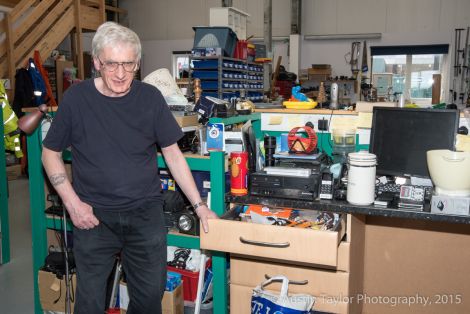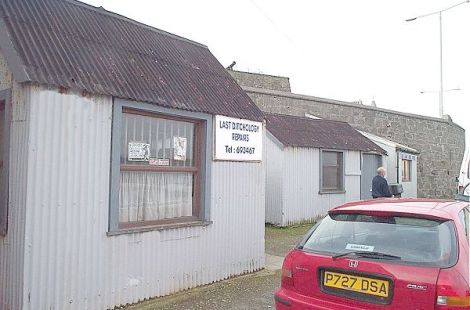News / Last day at work for Mr Last Ditchology
“It’s been a slow three months since Christmas,” said Brian Priest on the eve of his 65th birthday and his long awaited retirement from the world of working with electrical equipment.
A popular man with a dry sense of humour, Priest became something of a legend in Lerwick largely thanks to the inspired name of the business he set up in the late 1980s.
Last Ditchology was a name dreamed up over a couple of pints with a friend in the Norscot Angling Club.
“We were talking about a Maureen Lipman comedy when her son told her he had got a degree, and she said at least you’ve got yourself an ‘…ology’,” he recalled.
“Mike (Buchala, his friend) said if he ever set up his own business he would call it Last Ditch Repairs and somehow the two names got put together and that was it.”
Priest ran his little repair shop out of a dilapidated tin shed opposite the Albert Buildings where Lerwick Port Authority – then the Lerwick Harbour Trust – is based. He was next door to the equally legendary Harbour Café, better known by its regular customers as Lizzie’s Lodestar, and eventually took over that shed too.
He remembers the harbourmaster told him the tin shed had been marked for demolition for so long that it had been listed as a priority when he had started working 50 years earlier.
Priest’s career fixing things came about by accident. Born in Lerwick to parents raised in Unst, he moved to Huntly when he was two years old, where his father James John Priest worked for the Forestry Commission.
This land-based work was in contrast to his dad’s naval past, which had seen him win a George medal for his part in bringing in ammunition for the Dunkirk landings.
Become a member of Shetland News
“They would go in on the high tide, unload when the tide went down and float off on the next tide. It was dangerous stuff, the Germans were shelling all around, but he never spoke about it.”
The experience may have been why his father refused to let him follow his own dream of joining the merchant navy. “I wanted to go to sea; I wanted to work for the Hudson Bay Company too, but he wouldn’t have that either and in those days you did what your dad told you.”
Following his father’s advice to get himself a trade, he took up an apprenticeship in mechanical engineering in Aberdeen and “hated every minute of it”. So he absconded to London where he lived for years, squatting houses in wealthy parts of the city like Westminster and Victoria.
“Squatting was quite alright then,” he says. “They were quite happy to let you stay until they needed the house as long as you paid your rates. We actually squatted a Crown Estate house, but that only lasted three days.”
During those days of communal living in the ’70s he found himself repairing gadgets for friends. One day he opened up a kettle and found a circuit board inside. “That’s when I realised I needed to learn about these things,” he says.
At the time Margaret Thatcher had come to power, unemployment was soaring and the government had set up the first job creation schemes under the Manpower Services Commission.
Disabled with spondylitis, a curvature of the spine, he took advantage of the push to train people with disabilities and went to college in Exeter to learn all about electronics.
Returning to Shetland with his City and Guilds qualification under his arm he set up Last Ditchology in 1989, and, as he says, “the rest is history”.
Times were different then. Electrical equipment could be taken apart to be repaired and Priest’s services were much in demand.
“It worked good for years, but towards the end it was more difficult. People didn’t want things to be fixed the same because you could buy stuff so cheap and a lot of things you just can’t fix. That’s why I gave that up.”
He also got fed up with being self-employed and never seeming to have any money in his pocket after paying all the bills, so he was only too happy when Frank Millsopp from the social enterprise COPE came along and offered him a job.
“Frank was keen to get something going on the electrical side, and it was a relief for me to work and get paid at the end of the week.”
That was almost 10 years ago, since when he has thoroughly enjoyed working alongside COPE’s clients who have learning difficulties, some of whom have been with him from day one in May 2005.
Last Ditchology – he kept the name to begin with – shot to national fame in 2010 when it featured in Simon King’s Shetland documentary series. The famous broadcaster needed an expensive camera lens fixed, and while King winced in the background, the job was done, quite successfully, with the help of a large screwdriver!
But it’s other little episodes from his time wielding a soldering iron that Priest likes to remember:
“This guy came in looking for his lawnmower, and I said I didn’t have a lawnmower. I thought to myself I know this guy, his name’s Henderson and I thought I had a circular saw of his that had been lying around for some time. So I pulled it out and said ‘this is yours, isn’t it’. He said, ‘yes, that’s my saw, but I don’t know why it’s here…and where’s my lawnmower?’ But I never had lawnmowers.”
Last week colleagues and customers alike poured in to COPE to say good bye, bearing gifts and wishing Priest well for the future.
“It’s been kind of overwhelming,” he said. “You’re just plodding along, and it’s amazing what people do for you, I have got so much stuff.”
But he’s not looking back and has plenty to get on with in his retirement. “It will be strange for the first few weeks, but I’ve got lots of hobbies. I’ve just spent £900 on a camera, and I do a lot of walking and trout fishing, I have a boat at Clousta loch, and I enjoy my garden.”
He’ll also enjoy getting back to fiddling with electronics for pleasure rather than work, and has plans to convert three remote-controlled helicopters into a tricopter for fun.
So if you see a strange looking drone flying over Sandveien, you’ll know who’s at the controls.
Become a member of Shetland News
Shetland News is asking its many readers to consider paying for membership to get additional features and services: -
- Remove non-local ads;
- Bookmark posts to read later;
- Exclusive curated weekly newsletter;
- Hide membership messages;
- Comments open for discussion.
If you appreciate what we do and feel strongly about impartial local journalism, then please become a member of Shetland News by either making a single payment, or setting up a monthly, quarterly or yearly subscription.





























































